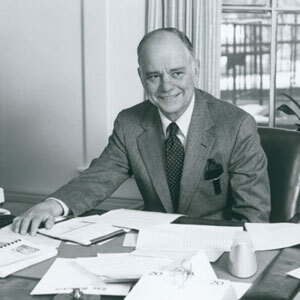Remembering James Lapsley
August 8, 2022 | Faculty, Featured, Public

Theologically, one cannot be born a Presbyterian, but James Norvell Lapsley, Jr. came close. Born on March 16, 1930 in Clarksville, Tennessee, Lapsley came from a long line of Presbyterians, several of them ordained clergy and Princeton Theological Seminary alumni. So it’s no surprise that Lapsley, after earning his BA from Southwestern at Memphis (now Rhodes College) in 1952 and marrying his high school sweetheart Brenda Weakley, followed a call to pursue ordained ministry himself.
He enrolled in Union Theological Seminary in Richmond, served two years as a pastor after graduation, and ultimately found himself at the University of Chicago, where he pursued a doctoral degree in pastoral theology under his mentor, Seward Hiltner. In 1961, Lapsley followed Hiltner to Princeton Theological Seminary and began his teaching career. Princeton would be his home for the next three decades, and where he and Brenda would raise their two children, Joseph and Jacqueline.
Lapsley went on to have an illustrious career, integrating what he understood to be the best of the social sciences with the best of Christian theology. His career is marked by several books (e.g., The Concept of Willing, Salvation and Health, and Renewal in Late Life Through Pastoral Counseling), a place on the editorial board of the Journal of Pastoral Care, and tenure as chair of the editorial board at the discipline’s flagship journal, Pastoral Psychology. He co-founded the Clinical Pastoral Education program at Robert Wood Johnson University Hospital, as well as the Society for Pastoral Theology, which publishes the Journal of Pastoral Theology, another premier publication in the field. In addition to his work as a professor, he served as the Seminary’s academic dean from 1984-1989.
“Jim Lapsley was a sensitive man shielded by a stoic veneer,” says Charlotte W. Newcombe Professor of Pastoral Theology Robert Dykstra, a former student of Lapsley’s. “I was always impressed that he deflected attention from his own keen intellect, enviable clinical pedigree, and enormous contributions to the formation of the young discipline of pastoral theology to instead allow his Princeton colleague, Seward Hiltner, greater visibility and accolades as its academic founding father. Jim seemed content in the role of Samwise Gamgee or Ron Weasley to Hiltner’s Frodo Baggins or Harry Potter, and I admired this modesty and steadfastness in him.”
Lapsley’s noteworthy work life was enriched by a robust retirement, which began in 1992 after 31 years in service to Princeton Seminary. His love for music led him to serve in various leadership capacities with symphonies and other arts organizations, as well as local congregations where he lived in Sun City and Flagstaff, Arizona. After Brenda’s death, he married Helen Winter, and the pair traveled the world together, visiting all the major opera houses, and enjoying the music they both loved. He spent his personal time hiking, reading, and writing.
Lapsley was a very private person, a man of dry wit and few words. Instead, he expressed his care through acts of support. He was widely known as someone who picked up the phone and called students when he sensed they were struggling; colleagues, neighbors, and family remember him as someone who was always there, in his signature fedora, to provide reserved but reliable help in a difficult moment; and, as a professor, he was ever encouraging of his students’ pursuits. “As his onetime student, I was struck by the great freedom he allowed us to explore our own interests to see where they might lead, again willing to step out of the spotlight to allow others to shine,” recalls Dykstra. “He was a steady pioneer in a once, and maybe forever, fledgling discipline.”
Lapsley died on October 28, 2021. He will be remembered for his impactful scholarship, his seminal work to develop his discipline, his love of complex music, his quiet demeanor, and his unrelenting love and support for those he cherished.





